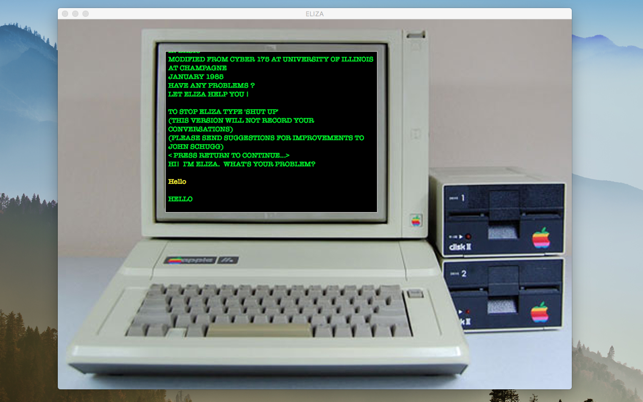價格:免費
更新日期:2019-08-27
檔案大小:7.2 MB
目前版本:2.00
版本需求:OS X 10.10.0 或以上版本,64 位元處理器
支援語言:英語

ELIZA is an early natural language processing program created between 1964 and 1966 at the MIT Artificial Intelligence Laboratory by Joseph Weizenbaum.
Eliza simulated a conversation betwen man and machine, by using a system of keywords and scripts meant to react to them.
The most famous script, DOCTOR, simulates a Rogerian psychotherapist. It uses rules to respond with non directional questions.
Eliza is in a sense the mother of all today's chatbots.
It was quoted at the time of being able to pass the Turing Test. Developed by Alan Turing in 1950, it evaluates the machine's ability to exhibit intelligent behaviour equivalent to, or indistinguishable from, that of a human.
Since then, Artifical Intelligence has made remarkable progress, but it is interesting to see what these early programs were able to achieve, with fractions of the computing power of a modern smart phone.

This app is based on a BASIC listing published by Steve North in Creative Computing back in 1986.
The original print is visible by clicking the blue circled italic "i". It can be saved as PDF or sent to Preview for easy reading.
Programmers will be interested to analyze the code.
This is an important piece of history for whomever is interested in computing culture.
This presentation is a revival of the port I made back then in AppleSoft Basic on my own Apple //e with the very same green screen, and the very same floppy drives. I simply regret not to be able to locate any original sound of the machine (35 years ago !) for a complete ambiance.
Don't be mistaken into thinking this is a game. It is much more a glimpse into early code, as well as an occasion to understand how chatbots came to be.

Someone mentioned a TRS-80 implementation supposedly more impressive. If anyone could send the author the source of that program, it will be great to do a "TRS-80" version. But the idea, here, is not to have more features, but rather, to grasp this historical part of natural language computer interaction.
